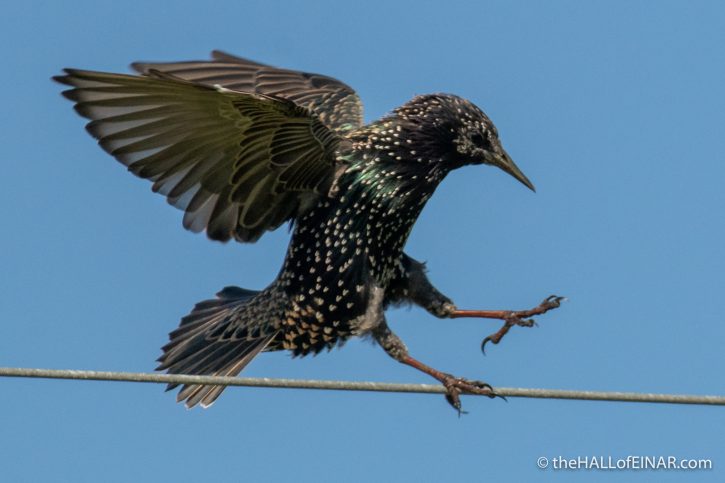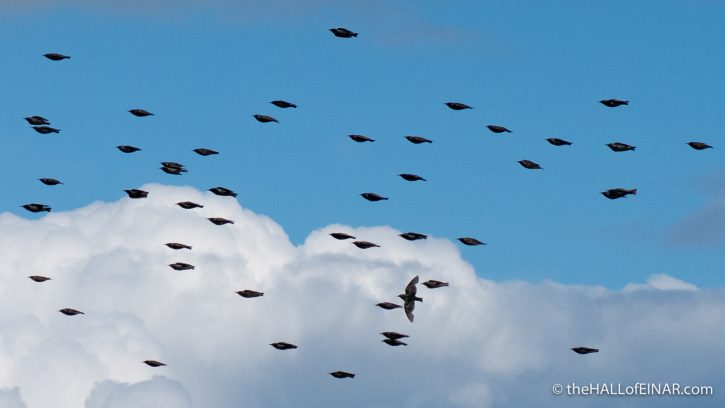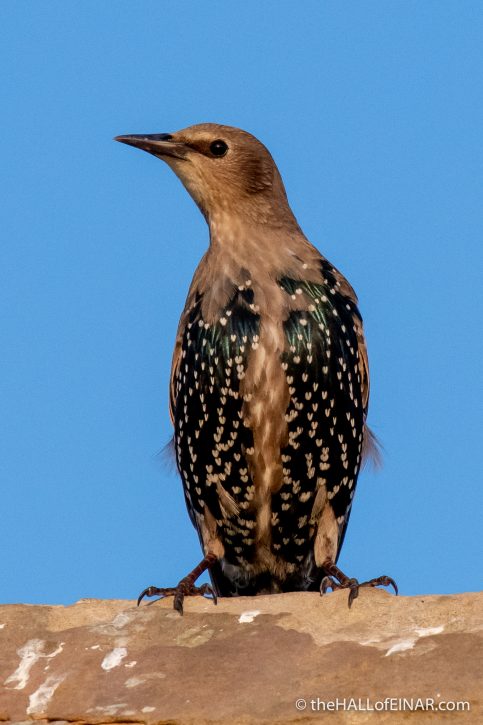“The flesh of the stare is very bitter”
This week I’m reading Reverend George Low’s Fauna Orcadensis from 1813.

Today it’s the entry on the Starling:
This is a harmless, prattling, mimic bird, found in thousands in the Orkneys; breeds in old houses, churches, the sea-rocks, &c.; seems to be a favourite in Orkney, as few houses are built but they leave several holes in the wall for its convenience, of which it always, as if sensible of the favour, avails itself, and repays it with a song, and a deal of its antic mimicry.
The Orkneys? Didn’t he know that Orkney is already a plural?
I have often been much diverted to hear a couple of cock stares, perched upon two opposite chimneys, trying to excel one another in imitating all the noises below, the crowing of cocks, cackle of hens, barking of dogs, mewing of cats, particular notes of different wild birds; all this intermixed with its own natural harsh discordant squeak; insomuch, that a macaroni from every nation in Europe, placed together to dispute concerning some important alteration to be made on a button-hole, or the best method of scenting a bouquet, could not make a more dissonant jangle than these birds, when in the humour of mimicry.
A macaroni? In England in the mid-18th Century a macaroni was an effeminate or homosexual man who was the height of fashion. Its origin is from men who had been on a Grand Tour of Europe and come back from Italy with a taste for macaroni pasta, which was unknown in England at the time. Anything terribly fashionable was ‘very macaroni’. You might have heard its ironic use in the American Revolutionary War song Yankee Doodle Dandy where he “stuck a feather in his hat and called it macaroni.” Simply sticking a feather in your hat wouldn’t do, and wouldn’t be nearly fashionable enough. Rev. George Low’s usage is the equivalent of comparing Starlings to metrosexual hipsters now.
The Oxford Magazine of 1770 makes it clear what they think of people they refer to as ‘macaroni’: “There is indeed a kind of animal, neither male nor female, a thing of the neuter gender, lately started up among us. It is called a macaroni. It talks without meaning, it smiles without pleasantry, it eats without appetite, it rides without exercise, it wenches without passion.” It seems that today, 250 years later, we’re simply repeating the bigotry of the past.

The Rev. George Low continues:
The stare feeds on worms and insects, and in winter when the earth is locked up with frost, comes down to the sea side, where it lives on the sea-louse (as it is here called), insinuating the point of its bill under the stones, and hastily opening it, jerks the stone over, immediately seizing what may be underneath.
The flesh of the stare is very bitter, but this may in some measure be remedied, by wringing off the head of the bird immediately as caught that the blood, in which the bad taste is, may run from it. Young stares are tolerable eating. This bird is well known, and as well described in Mr Pennant’s British Zoology, a book in so many hands, as to render a particular description here unnecessary, only I shall observe, that the young birds do not acquire their perfect colours for the first year, but are of an uniform dusky brown, with a yellowish stripe running from the lower jaw down to the breast; and, besides, may be known by their particular note.
“Wringing off the head”? People really did eat anything, didn’t they? “Tolerable eating”? Dear me. Here’s a young bird, as described by Rev. Low:
There’s also a report of a leucistic Starling, one with the majority of pigment missing:
I have heard of one example of a stare, in the nest of which there was four young, two of which were black, the others gray, and grew whiter as they grew older. I imagine stares breed twice a-year, as the first brood has left the nest now in June, and I have observed them very busy in repairing their nests, and rearing another in August.
I was surprised to find him referring to Stare rather than Starling until I realised what had been staring me in the face: Stare is their original name and Starling was the name of the juveniles. Eventually Starling supplanted Stare and came to mean the adults as well.

Stares and Starlings: allowing people to vent their prejudices since time immemorial.
